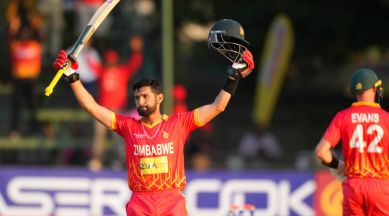Sikandar Raza doesn’t mind breaking into some chaste Urdu. If anything, he yearns to speak in his mother tongue, never letting go of an opportunity to do so.
Back in 2013, he had became the first non-residential player to represent Zimbabwe in international cricket. That was the time, world cricket was witnessing the trend of Pakistani expats plying their trade in adopted lands, starting with Imran Tahir’s move to South Africa. But Raza’s was not the routine immigration story, laden with several obstacles and social challenges.
His move to Zimbabwe came more via a touch of serendipity. Tasadaq Hussian Raza, Sikandar’s father, had moved to the African nation back in 2002 to expand his motor-parts business ambitions from Japan. The junior Raza, meanwhile, was busy preparing for a career in the gargantuan world of software, pursuing a degree in Scotland.
He dreamt of becoming a fighter pilot through his teenage years and it was only the heartbreak of missing out on that goal that pushed him into considering a move to Zimbabwe.
The fighting spirit was there to see in Raza’s 95-ball 115 at Harare in the final ODI India-Zimbabwe series. Though the series was dead and the hosts were chasing a tough target 290, Raza didn’t give up. India eventually won by 13 runs as Raza’s century went in vain.
#3rdODI |EARLIER! @SRazaB24 scored his sixth ODI hundred off 88 deliveries 🙇♂️#ZIMvIND | #KajariaODISeries | #VisitZimbabwe pic.twitter.com/bOxbuzww7D
— Zimbabwe Cricket (@ZimCricketv) August 22, 2022
But most importantly, Raza had made a point. While the world might have doubted Zimbabwe’s talent pool, Raza’s family always backed him.
“He was always a good cricketer since childhood. When he made a complete switch to Harare, my father asked him to try his luck with cricket here. Somehow he saw some potential in Sikandar and believed in it,” his younger brother Taymoor had told The Indian Express. He also added that his father and two other uncles too had aspired for representing Pakistan during their youth but moved onto other things.
While scoring runs never proved too much of a hassle for the right-hander, there were other legal hassles to be sorted out. In fact, he had been playing semi-professional cricket even in Scotland and before long he was one of the star sensations in the local league around Harare. He finished as the highest run-getter in the T20 tournament and was third highest in the 50-over league. Getting the qualification to don Zimbabwe colours though proved to be a lengthy and frustrating wait. And it was only following the persuasion of former captain Alistair Campbell that Raza agreed to remain patient and bide his time.
Belvedere, where the Razas reside, is a small area in Harare, which has been home to a majority of the city’s Asian population. So it isn’t a surprise to see a huge section of Asian fans when Raza is on the field.
“My whole community came to watch me the other day. They didn’t expect anything from me but they just wanted to see me play against a top side like India,” he says.
While cricket has brought some fame and international coverage for the soft-spoken opener, Raza, back in 2013, had said that what he cherishes the most was the praise of his grandfather back in Sialkot.
Subscriber Only Stories
“When he found out about me playing international cricket, he said that I had made the family really proud all around the world,” Raza had said.
